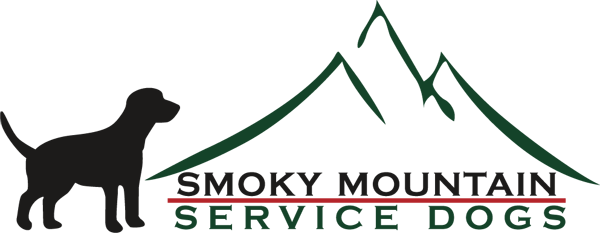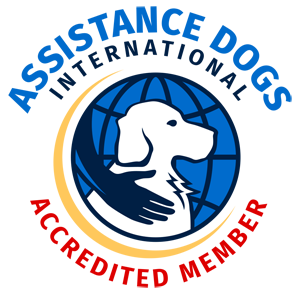SERVICE DOGS FREQUENTLY ASKED QUESTIONS
Who is Smoky Mountain Service Dogs?
Smoky Mountain Service Dogs is a 501(c)(3) non-profit organization with a mission to Enhance the Physical and Psychological Quality of Life for Veterans and First Responders with Disabilities by Providing Custom-Trained Mobility Assistance Service Dogs.
What Type of Service Dogs are Trained by SMSD?
- SMSD trains mobility assistance service dogs where canine assistance is appropriate like balance assistance, picking up dropped items, et cetera. We do NOT train dogs for the following:
- PTSD unless the veteran or first responder has a physical disability that is appropriate for service dog assistance such as balance assistance while walking, picking up dropped items, et cetera
- Seizure alert or response
- Diabetic alert
- Guide dogs for sight issues
- General disabilities
Can you train my pet dog or one that I purchase to be a service dog?
We do NOT train dogs owned by individuals – only the dogs chosen by our Canine Program Manager.
If I train my own dog, can SMSD certify my dog so I can get VA service dog insurance?
No, we do not provide that service. Someone who has personally or privately trained their dog may be accepted into an ADI (Assistance Dogs International) accredited program that accepts a privately trained team for evaluation and possible further training/certification. These organizations do not simply administer tests to verify or certify an assistance dog. ADI standards require that there is a minimum six-month training period for these teams. For a current list of members that consider working with owners and their personal dogs visit www.
What is the service area of Smoky Mountain Service Dogs?
SMSD’s service area is regional, serving a 350-mile radius or an approximate six-hour drive from Knoxville, Tennessee. SMSD serves the entire state of Tennessee and portions of Alabama, Georgia, North Carolina, South Carolina, West Virginia and Virginia regionally.*
A regional service area allows our trainers to work extensively with the recipient throughout the training process as well as after camp ends and the team goes home. This service area allows SMSD to do home visits and meet-and-greet sessions to be matched to a service dog as part of the application process. It also enables trainers to be able to do remedial training visits after placements in the event of problems that can’t be corrected by phone or video.
*Please note that we do have the ability to OVERRIDE the service area with SMSD board approval when the applicant meets the application criteria and is approved by the SMSD application team.
What type of dogs does Smoky Mountain Service Dogs use and where do they come from?
The majority of our dogs are Labrador Retrievers and Golden Retrievers and come from reputable breeders who strive to breed dogs with the size, temperament and behavioral traits conducive to excellent service dogs. SMSD will, when appropriate, use rescue/shelter dogs or owner surrender dogs. All dogs are selected by our Canine Program Manager and must also be approved by our veterinarian.
What are ADI (Assistance Dogs International) standards?
In order to meet ADI (Assistance Dogs International) standards a service dog must:
Be trained to perform at least three tasks to mitigate the client’s disability. The client must also be provided with enough training to be able to meet the ADI Minimum Standards for Assistance Dogs in Public. The client must be able to demonstrate:
- That their dog can perform at least three tasks
- Knowledge of acceptable training techniques
- An understanding of canine care and health
- The ability to maintain training, problem solve, and continue to train/add new skills (as required) with their service dog
- Knowledge of local access laws and appropriate public behavior
What is the value of a service dog that has been trained to perform mobility tasks and has passed a nationally recognized benchmark for training standards – the public access test?
Industry cost to select, raise, train, and place one mobility assistance service dog is estimated to be $25,000 to $30,000. Producing one mobility assistance service dog requires approximately 1500 to 1800 hours of training by our training staff. Volunteer puppy raisers, long- and short-term respites, socializers, and advanced fosters also spend countless hours reinforcing the basic obedience and advanced training our dogs get from our professional trainers.
What is the cost of a Smoky Mountain Service Dog to the client?
We place our dogs at no cost to our clients and cover training camp lodging fees (breakfast included). Lunch and snacks are covered during training camp sessions. Additional travel expenses such as fuel, tolls, and meals may be reimbursable by VA service dog veterinary benefits. The SMSD Veteran Liaison assists the Veteran in applying for those benefits through the VA.
Does Smoky Mountain Service Dogs require a background check for applicants?
Yes, all applicants must agree to a background check. A felony conviction or a conviction of a crime of domestic violence or animal abuse will result in disqualification. All other offenses will be evaluated based on their nature, severity and recency.
What is the application process to acquire a Smoky Mountain Service Dog?
There is no charge for the service dog as described above. There are six steps in the application process:
- Step one: Preliminary application. Complete the preliminary application on the website and submit. You will receive an acknowledgement of receipt within one week.
- Step two: Telephone interview. You will be contacted by a member of the application team for a telephone interview to determine if it is appropriate to move forward to the next application step. If the SMSD application criteria is not met, you will be referred to other Assistance Dogs International member organizations. Please note that it may take six months or longer to move to the next step depending on the SMSD applicant flow.
- Step three: Full application. Once the telephone interview is complete and no issues identified that might interfere with a successful service dog placement, you will receive a full application to complete. Once the completed paperwork is received by the SMSD Application Team and a background check is completed, your approval or declination for the next step will be done within a six-week period. All applicants that SMSD cannot serve are referred to the ADI organization member list.
- Step four: Home visit and Meet and Greet. If you are approved, a home visit will be scheduled either in person or via virtual methods. Timing of this visit varies due to the activities of SMSD and the schedule of the client and his/her family. This can take up to six weeks or longer. In addition, SMSD requires applicants to travel to the SMSD Veteran/Canine Training facility for a “meet and greet” with a potential canine match.
- Step five: Online training course and hands-on training camp. After you are matched with a dog, you will receive a link to an online training course. Once that is completed, we will schedule a hands-on, ten-day training camp for you at our Veteran/Canine Training facility in Lenoir City, TN.
- Step six: At the conclusion of training camp, a graduation ceremony is conducted and the Transfer of Ownership document is executed.
SMSD reserves the right to decline any application at any time during the application and placement process.
What are the estimated costs associated with owning a service dog?
SMSD strives to assist with initial costs ($200 – $500) of getting a service dog by providing you with a full package of items needed for owning a service dog such as crate, bed, one-month food supply food/water bowls, grooming supplies, dog bed, and toys at the end of camp. Yearly expenses thereafter are approximately $2,500 (vaccines, food, heartworm/flea preventative, grooming, treats, leashes, et cetera). Eligible veterans may receive benefits through the VA to reduce routine and unexpected veterinary costs. Alternatively, veterinary costs can be potentially reduced by enrolling in a pet insurance plan.
Who trains Smoky Mountain Service Dogs?
SMSD has a staff of four professional trainers managed by our Canine Program Manager. They are responsible for all age-appropriate training levels for our dogs. SMSD trainers are assisted by a large group of volunteers who go through comprehensive training to handle the dogs. Our puppies are raised by volunteer puppy raisers for nine to 12 months. During that time, they learn basic obedience and level one skills. They are then rotated into the kennel where our professional trainers take over all advanced training levels for approximately six months. They are then moved to advanced foster homes where their skills are practiced on a daily basis in the home and in public. At all levels, our dogs are continually socialized in public environments. Training classes for our puppies, dogs and our volunteers are ongoing throughout the entire training process to ensure that each dog is trained to the highest standard. They are ready for placement between two and three years of age.
How is Smoky Mountain Service Dogs Funded?
SMSD is an all-volunteer organization (with the exception of training staff and facility manager) and is funded by contributions from private individuals, groups, corporations and grants. We also conduct our own fundraising events annually – the Night for Patriots event and the SMSD Golf Challenge.
How old are the dogs when matched with their partner?
Our dogs will be placed at approximately two years of age.
Who can apply for a Smoky Mountain Service Dog?
Disabled veterans or first responders who have physical disabilities such as limb loss or traumatic brain injury (TBI) that would require the skills of a mobility assistance service dog. Veterans must have received an honorable discharge. All applicants must be able to demonstrate that a service dog will enhance their quality of life and independence. All applicants must be approved by our Client Application Team.
I am a Disabled Veteran, why should I work with my Veteran administration health care providers as I apply?
You may qualify for VA service dog veterinary benefits that are available only to Veterans enrolled through the Department of Veterans Affairs. The process starts with your VA primary care physician. The SMSD veteran liaison will provide information and guidance when you start the application process. In addition, there is a section of the full application that must be completed by your PCP.
How do I apply for a Smoky Mountain Service Dog?
You can click the “Apply NOW” button in the menu bar at the top of the page or click here.
How long will I have to wait for a service dog?
SMSD wait time is approximately 2 weeks to 3 months. The wait time depends on many variables (applicant flow, dogs in training, matching the right dog to an individual), but we will keep you informed of your status throughout the process. SMSD strives to keep dogs in various stages of training and development in order to have a regular supply available for matching and placement. Typically the entire process from initial application to training camp and graduation is completed within 6 months to 1 year, at times it is sooner.
When my service dog is ready for retirement, how long would I have to wait for a replacement?
Applicants seeking a successor service dog are given priority in screening and placement if appropriate and applicable at the time the current dog is retired. Recipients must still meet the application requirements of SMSD.
What is the law regarding service dog access to public places?
Under the Americans with Disabilities Act (ADA) and Tennessee law, all businesses that serve the public, such as restaurants, hotels, retail stores, taxicabs, theaters, concert halls and sports facilities, are prohibited from discriminating against individuals with disabilities. The ADA requires these businesses to allow people with disabilities to bring their service dogs onto business premises in whatever areas customers are generally allowed. Additional charges for admitting the service dog to an establishment or fares for transportation cannot be required. Religious facilities and residential facilities may refuse service dog entry. For a complete reading of public access laws, please visit https://assistancedogsinternational.org/resources/public-access-laws/



